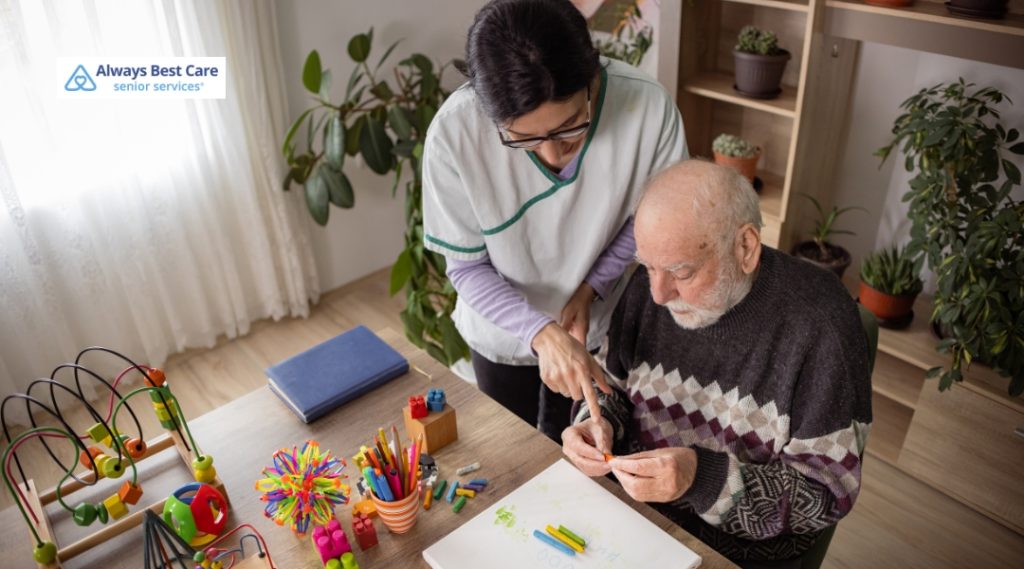Early Signs of Dementia You Shouldn’t Ignore

We all know that getting older comes with its quirks—maybe forgetting where you left your glasses or mixing up names now and then.
But sometimes, those little slip-ups aren’t just innocent forgetfulness; they could be the early signs of dementia creeping in.
Knowing when to take notice is crucial for keeping your loved one safe, supported, and living life as fully as possible.
At Always Best Care of Calgary SW, we’re here to help you spot those subtle changes before they become overwhelming.
Let’s break down what’s normal aging, what isn’t, and why catching these signs early matters so much.
What you will learn:
- How to recognize the difference between normal age-related forgetfulness and the early warning signs of dementia.
- The most common early symptoms of dementia.
- How Always Best Care of Calgary SW can support families with compassionate, personalized in-home care for loved ones showing signs of cognitive decline.
Table of Contents
Normal Aging vs. Early Signs of Dementia
Aging gracefully often means dealing with a slower recall or occasionally losing track of why you entered a room, but usually, that info bounces right back. People managing normal aging still juggle daily tasks like cooking meals, paying bills on time, or chatting without trouble.
Dementia doesn’t play by these rules. It’s a progressive condition that chips away at memory, judgment, communication skills, and eventually, independence itself takes a hit. The key? Spotting those first warning bells before things spiral out of control allows families to plan smarter care strategies while preserving dignity.

7 Key Early Signs of Dementia You Shouldn’t Overlook
Here are some red flags that might raise an eyebrow:
- Memory glitches that disrupt daily life: Not just forgetting keys but repeatedly missing appointments or relying heavily on reminders for things once second nature.
- Trouble finishing familiar chores: Struggling with simple recipes or managing finances may indicate fading concentration.
- Difficulty finding words or following chats: Pausing mid-sentence more often than usual; repeating stories without realizing it.
- Poor decisions popping up unexpectedly: Giving away money impulsively or neglecting basic hygiene aren’t typical age-related behaviours.
- Getting lost in once-familiar places: Confusion about dates or directions can signal deeper issues.
- Mood swings and personality shifts: A social butterfly suddenly turning withdrawn—or bouts of anxiety and irritability—might be more than just moodiness.
- Misplacing items oddly & unable to retrace steps: Like finding the remote in the fridge instead of on the table!
When Should We Step In?
Notice one—or heaven forbid—a few? Don’t wait around hoping it’ll pass! Getting an expert opinion sooner rather than later opens doors for diagnosis accuracy, plus access to treatments and resources tailored specifically for your family member’s needs.
Early action also helps keep everyone involved informed, not left guessing what’s next, and ensures safety nets go up while independence remains intact wherever possible.

How Always Best Care Can Help With Early Signs Of Dementia
Caring at home beats any nursing facility hands down when comfort counts most—but it isn’t always easy juggling caregiving duties alongside everything else life throws our way.
That’s precisely where we come in at Always Best Care of Calgary SW. Our caregivers don’t just check boxes—they understand cognitive decline intimately enough to notice shifts day-to-day while providing companionship that feels like family, not hired help.
From reminding meds schedules gently (without nagging!) through encouraging brain games designed to keep minds nimble, we’re there every step so families breathe easier knowing their loved ones are genuinely cared for under one roof.
FAQ
Q: What makes early dementia different from regular forgetfulness?
A: Regular forgetfulness usually doesn’t stop someone from handling everyday activities independently; early dementia causes memory loss severe enough to disrupt daily tasks like paying bills or cooking meals properly.
Q: Can lifestyle changes prevent dementia symptoms?
A: While no magic cure exists yet, staying mentally active through puzzles/books/social engagement combined with good nutrition can slow cognitive decline progression somewhat.
Q: When should I talk with my doctor about my concerns?
A: If noticing repeated memory slips affecting routine functioning or sudden behavioural changes, it pays off big time to contact healthcare providers promptly rather than waiting months.
Q: How does home care support improve quality of life during the early stages?
A: Home care preserves familiarity, helping reduce stress/anxiety while offering needed physical aid, plus an emotional connection, which hospital stays rarely match.

Book Your Free Consultation With Always Best Care of Calgary SW and Give Your Loved One the Support They Deserve!
If you’re concerned about memory changes in someone you care about, don’t wait to take action. Contact Always Best Care of Calgary SW at (403) 768-4454 for a care consultation. Our experienced team can help you understand your options and create a care plan tailored to your loved one’s unique needs. Early support matters—and you don’t have to navigate it alone.





